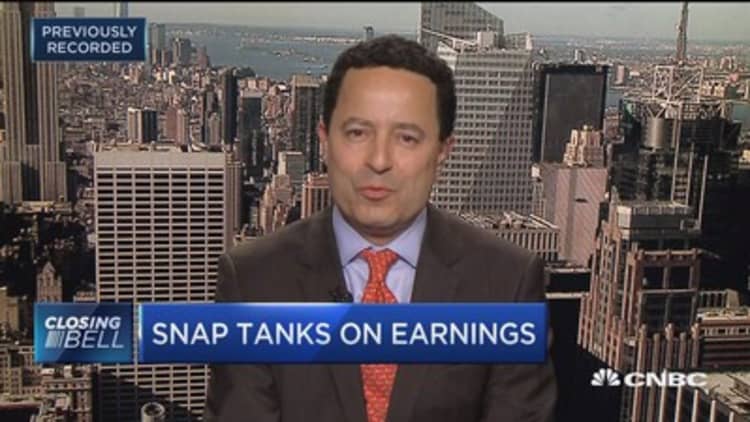Two technology giants in China are vying for gains through initial public offerings on major U.S. stock exchanges.
"You've got this indirect battle going on between Tencent and Alibaba," said Kathleen Smith, principal and manager of IPO ETFs at Renaissance Capital. "The forces are all lining up when it comes to commerce, payments. It's pretty hard to come up against these companies."
Chinese Search engine Sogou (SOGO) debuted at $13 a share on the New York Stock Exchange Thursday, giving the company a market value of about $5.4 billion. Tencent has a 43.7 percent holding of Sogou's Class A and Class B shares, according to Sogou's September filing with the U.S. Securities and Exchange Commission, accessed through S&P Capital IQ.
Sogou is just the latest Tencent investment to go public. Tencent subsidiary and e-book company China Literature debuted in Hong Kong on Wednesday local time in a public offering which was oversubscribed by more than 600 times and roughly doubled on its first day of trading. Tencent is also reportedly planning an IPO of its music streaming unit, and per S&P Capital IQ is the second-largest investor in Sea, a $4.8 billion Southeast Asian internet company that listed on the NYSE on Oct. 20.
Earlier that week, Alibaba's affiliate, Ant Financial, backed microlender Qudian's public offering on the New York Stock Exchange. Alibaba was also behind the September IPO of Best, a $4.4 billion logistics company.
"Some of the bigger companies like Alibaba, Tencent, they add a lot of credibility to the deals because they're known names," said Drew Bernstein, co-head of the China practice at Marcum Bernstein & Pinchuk, an auditor of Chinese IPOs in the U.S. "They're investing in basically something that's going public and they know that their name carries weight. If they bring credibility, they bring value."
With Sogou, 11 Chinese companies have gone public in the U.S. this year, according to Renaissance Capital, on pace for the highest number of Chinese IPOs in the U.S. since 2014 when 16 such companies, including Alibaba, went public.
Alibaba Group has a market capitalization of $475 billion. Its shares are up about 111.7 percent this year. The Chinese e-commerce giant run by Jack Ma also has several affiliates in payments, logistics and cloud computing. In the last few years, Alibaba has branched out into media and sports with its investment into Guangzhou Evergrande Football Club and purchase of the South China Morning Post newspaper. The latest moves by Ma, who is executive chairman, ahead of China's version of Black Friday, Singles Day on Nov. 11, are recording a duet with pop star Faye Wong and starring in a short martial arts movie.
Tencent co-founder Pony Ma is far more low-key than Alibaba's founder, although the company's messaging app WeChat dominates China. The company reported 963 million monthly active users for the app, known locally as Weixin, in the second quarter. Tencent is listed in Hong Kong and has a market capitalization of 3.68 trillion Hong Kong dollars ($470 billion). The shares are up 104 percent in local currency terms this year.
Tim Seymour, managing partner at Triogem Asset Management, said investing in some of the largest East Asian companies is like investing in a venture capital firm. Venture capital typically can involve more risk, but potentially higher reward for investors.
"Thus far their VC approach is well documented in China and Asia, but significantly less so in the USA," Seymour said of Tencent.
Not only does Tencent have holdings in some of the latest IPOs, but the company took a nearly 5 percent stake in Tesla earlier this year, according to S&P Capital IQ. On Wednesday, a day after Snap reported a huge revenue miss, the company said Tencent now has a roughly 10 percent stake in the Snapchat parent.
"We believe Tencent views this investment as a strategic move and it may explore opportunities to collaborate, especially on mobile game publishing and newsfeed," Morgan Stanley equity analyst Grace Chen, who is overweight on Tencent, said in a Wednesday note. "We will monitor Tencent's action plan, but view the investment as a potentially positive move if it is able to execute as intended; we view it as one of Tencent's initial steps towards globalization."
— CNBC's Michael Bloom contributed to this report.
Disclosure: CNBC parent NBCUniversal is an investor in Snap.
WATCH: Snap shares rebound after Tencent acquires 10% stake



